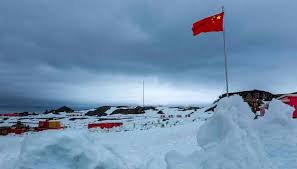When the northern hemisphere embraced the summer solstice, its longest day of the year on June
21, members of China’s 36th Antarctic expedition team were spending the longest night of the
South Pole at the country’s research bases Zhongshan and Great Wall Stations in Antarctica. The
day is also known as the Midwinter Day.
It was pitch-dark outside at 10 am in Antarctica, when nothing could be seen except a power
station, a sewage treatment building, and a waste incineration building that are lighted all the time
during the polar night period.
The illumination helped bring the shadowy figures of a few icebergs located a little further away
in the sea to the view from the windows of Zhongshan station.
Since late May, when Antarctica entered the polar night period, the sun was no longer in sight.
However, glimmering in the clouds is visible in the northern skies when the weather is clear at
noon, presenting reddish or crimson colors.
Sun Xiaoyu, a member of the wintering team at the Zhongshan station and head of the scientific
investigation group, together with other eight members of the group, would enter the darkness
every day for research tasks according to their own schedules.
Antarctica is an ideal and natural lab for scientific researchers because of its rare landforms,
climate, and magnetic field. In particular, the environmental changes in the extremely cold polar
nights during the winter offer the best opportunity for special scientific experiments.
Every trip of the researchers is an exploration of the unknown world, as they are often confronted
with constant dangers on the surface of sea ice.
Different varieties of icebergs and ice cracks radiating from them are seen everywhere on the
surface of sea ice, while no one can tell whether the ice is thick enough to hold their weight.
Because it’s barely possible to identify the ups and downs of the snow-covered ice when there is
no sunlight, the researchers have to take every step cautiously among disordered ice chunks and
snow banks more than a meter high with great difficulty.
According to Sun, once a bearing of a bogie wheel on their snowmobile was broken about five
kilometers away from Zhongshan Station because of the bumpy ice surface, and they couldn’t use
their basic maintenance kits to repair it. Fortunately, the communication network worked well,
which enabled them to ask for help from the station.
It was over 20 degrees Celsius below zero then, and Sun and his colleagues waited on the ice for
around four to five hours, during which period they ate up all the chocolate they brought and were
freezing all over. Fortunately, the rescue arrived timely.
Overwintering in the Antarctica means challenges both physically and mentally.
Qin Zhonghao, one of the overwintering members of Zhongshan station, who is also the doctor of
the team, said the wind in Antarctica is the driest and the strongest wind he has ever experienced.
It feels like a knife cutting on the face, Qin said, adding that every time when they go out, his
fellow team members always have to spend a considerable amount of time putting on protective
device to ensure no skin exposure.
However, the wind in Antarctica is rather crafty, as it knows how to get to you.
Sometimes the researchers would take off their gloves in order to perform tasks more flexibly, or
they simply forget to tuck in their clothes before work. In this case, their faces and hands could
easily become chapped, or get frostbite.
“My heart aches every time I dress the wounds for my colleagues, so I often remind them to stay
in good protection almost in a half-begging and half-warning way,” Qin said.
It is always dark outside during the overwintering period, when team members at the Antarctic
research stations often suffer psychological imbalance caused by physiological changes due to
lack of sunlight. Besides, they feel lonely and worry about their families when they are far away
from home for a long time.
According to Qin, apart from proactively seeking positivity, researchers also take part in group
activities for mutual support.
They watch films on Monday and Thursday, and exercise every day, Qin disclosed, adding
“People can get overthinking when they are alone. By communicating more with each other, we
can give and receive more comfort.”
Qin Donglei, a member and cook of the overwintering research team of Zhongshan station,
prepared a nice meal for his colleagues on the Midwinter Day.
Sitting at a long table made up of three smaller tables, the 22 team members enjoyed the delicious
food and pleasant conversations.
“In an effort to continue the Antarctic research tasks, my 21 fellow team members chose to stick
to their posts. It was our group’s trust in me that gave me this opportunity to cook for them and
ensure that they can enjoy every meal here,” said Qin, who is resolved to carry on his mission,
though the food materials are limited and it is hard to cater for the appetites of all the members
who come from different parts of China.
The job is fulfilling not only because it’s based on a sense of mission, but that he enjoys the close
bond with his fellow team members, Qin noted.












